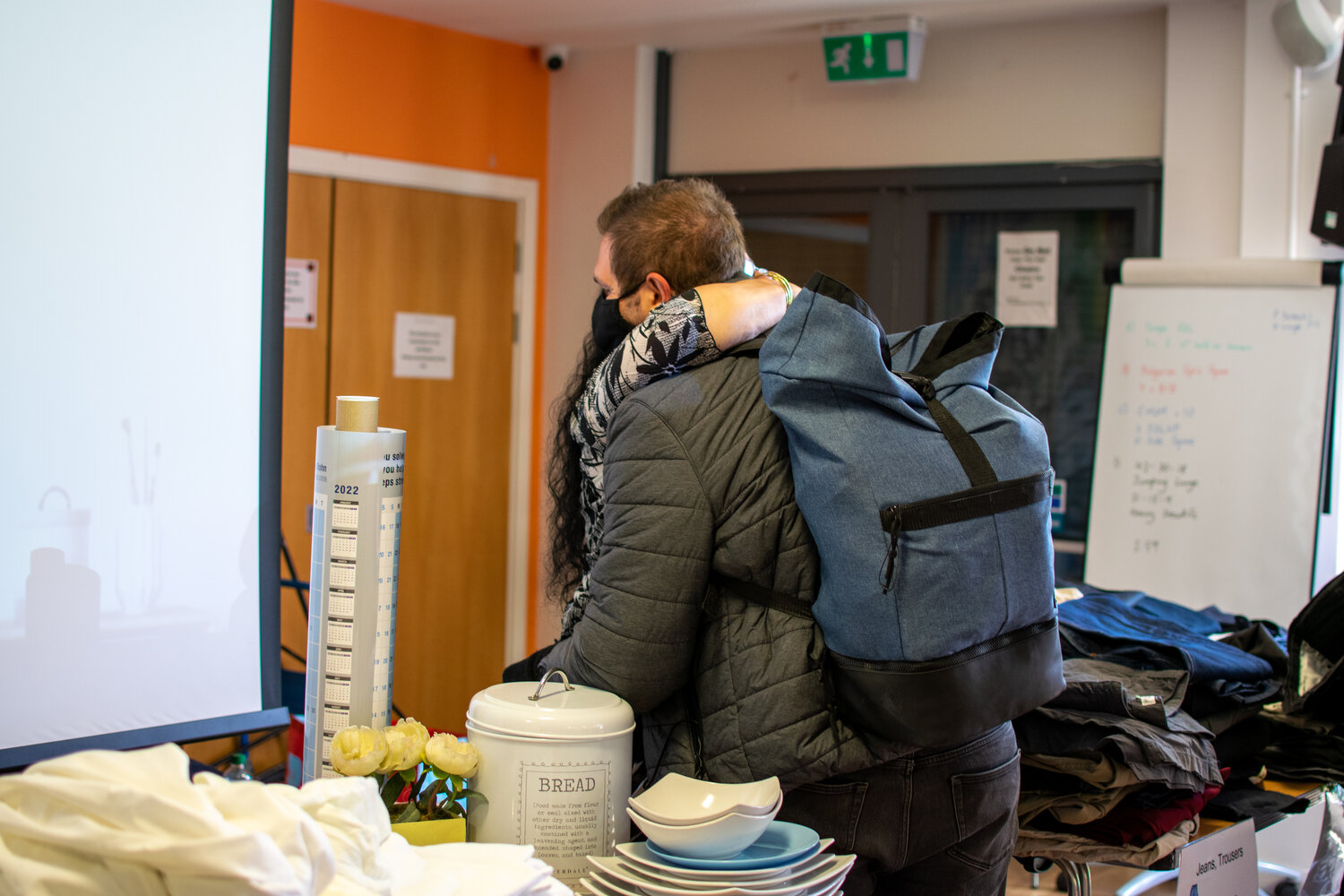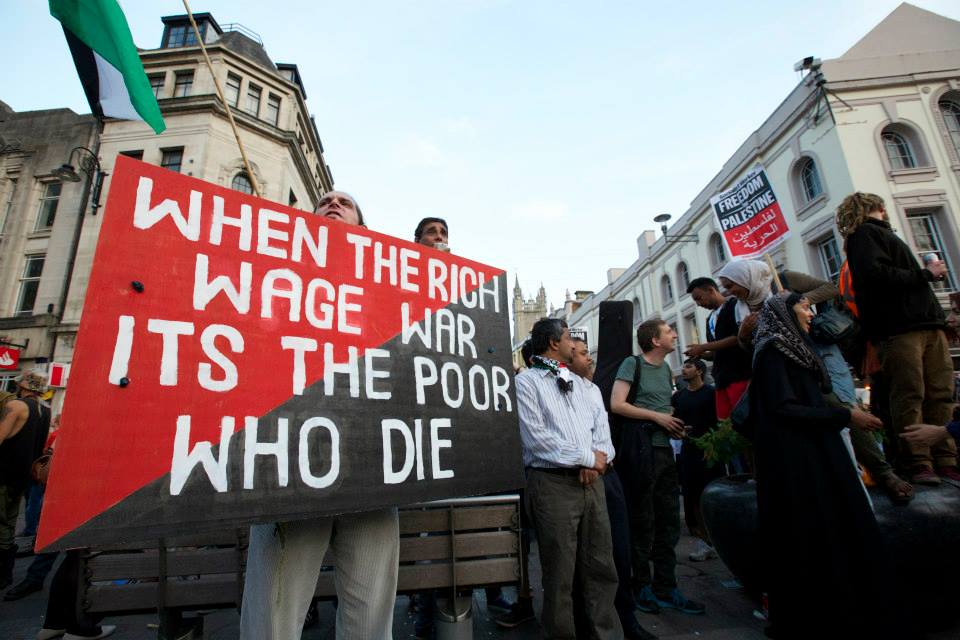
Investing In Apartheid – How Pensions In Wales Fund Violence in Palestine
As Israel’s assault on Gaza and escalation of violence in the West Bank continues, more and more people across the world are questioning how the state and its occupation apparatus are funded. Rebecca Wilks investigates how pension funds from Welsh councils are used to support Israeli apartheid, and how those campaigning for divestment are being silenced by new legislation.
By Rebecca Wilks. Cover image: : Palestinians inspect the damage following an Israeli airstrike on the El-Remal aera in Gaza City on October 9, 2023. via Wafa
Following the 7th October Hamas attack on Israel, the state has responded with a policy of collective punishment against Palestinians living in both Gaza and the Occupied West Bank, cutting off food, water, and power to the Gaza Strip while conducting an unrelenting and indiscriminate bombing campaign that has seen schools, hospitals, ambulances and bakeries deliberately targeted, and endorsing a sharp escalation in long-running violence towards Palestinians by Israeli settlers in the West Bank.
The result in Gaza has been a death toll of at least 11,078, around 41% of whom were children. Many more are thought to be missing under the wreckage of bombed-out buildings, and just under 28,000 people have been injured. At least 183 Palestinians have been murdered in the West Bank, including a father and son shot by Israeli settlers while attending a funeral for other victims of settler violence.
If you’re employed by a Welsh council, your pension payments are most likely invested in the companies that keep this violence running.
Welsh council pension funds have confirmed to Voice.Wales that they do not intend to review their more than £370 million invested in companies linked to Israeli human rights abuses.
The funds were previously approached about these investments in summer 2022, after it was announced that they would be withdrawing their money from Russian companies as a result of the country’s invasion of Ukraine.
Though the Israeli occupation of Palestine had at that time already been described as apartheid by Amnesty International, Israeli human rights group B’Tselem and the UN Special Rapporteur on Human Rights, the Wales Pension Partnership said that it preferred instead to “engage” with the companies in question.
Now, despite warnings from a UN human rights expert that Palestinians “are at grave risk of genocide” by the Israeli state, and despite the use of openly exterminationist language by Israeli government ministers, the Wales Pension Partnership has confirmed that its position on its complicit investments remains unchanged.
What are complicit investments?
When employees of Welsh councils make pension contributions from their monthly pay, the money is invested in stocks on their behalf, with any earnings from these investments going towards providing an income for the person upon their retirement.
In 2022, research undertaken by the Palestine Solidarity Campaign (PSC), found that 63 council pension funds across England and Wales had invested £4.6 billion in companies complicit in Israeli human rights abuses against Palestinian people.
In Wales, council pension funds have given out more than £370 million in complicit investments, with the Greater Gwent (Torfaen) fund – which handles the pensions of council workers in Torfaen, Blaenau Gwent, Caerphilly, Monmouthshire and Newport – investing the most, at over £110m.
Only the Cardiff and Vale pension fund did not have complicit investments.
Kathy Brooks, chair of the Montgomeryshire PSC branch, one of five active in Wales, told us: “Israel can only maintain its grave breaches of international law and Palestinian human rights because of the products, equipment and services it receives from a range of companies and financial institutions - these are companies that supply the Israeli military, but also those that provide technology, funding and equipment for Israeli settlements on Palestinian land.”
These settlements - established by forcibly evicting Palestinian communities and seizing their land and property - are illegal under international law, and the Office of the High Commissioner on Human Rights at the United Nations (UN OCHR) keeps a list of companies that operate in them.
“They're built on stolen Palestinian land, and they’re only possible because the Israeli Government provides huge incentives for them - from planning permission to tax breaks and subsidies,” Kathy said.
Arming Israel
Welsh council pension funds have a combined total of more than £161m invested in companies that supply the Israeli military.
Among the top beneficiaries, receiving more than £32m each, were General Electric and BAE Systems. The arms giants have supplied the IDF with weapons systems, engines and other components for the regime’s fighter jets, military helicopters and missile ships.
Welsh pension funds own £626,799 in shares of French firm Thales and Israeli military contractor Elbit, which together produce surveillance and attack drones for the IDF. Their Watchkeeper drones - some made in Aberporth, Ceredigion - have also been used by the UK Government to surveil refugees crossing the English Channel.
Thales received the bulk of its investment, £262k, from the Greater Gwent pension fund. The company, which this year has made $1.2 billion in profits, recently partnered with the Welsh Government to open two cyber research hubs in Blaenau Gwent, and was awarded £15m in public money for the project.
Many of these arms firms have enjoyed significant stock price rises as a result of the escalating violence in Palestine, with executives describing the war as an “opportunity” in a recent earnings call.
Supporting settlements
Welsh council pension funds have also invested in eleven companies that feature on the UN OCHR list of businesses active in illegal Israeli settlements. They include travel websites Booking.com, Expedia and AirBnb - which each advertise holiday properties built on seized Palestinian land - and a number of Israeli banks that fund the development of settlements. Booking.com received £40m in pension pot money, more than any other complicit company discussed here.
Other notable beneficiaries were Caterpillar, manufacturer of Israel’s D9 armoured bulldozers, some custom-fitted with machine gun mounts, which are used to demolish Palestinian houses, and Hewlett Packard, which provides servers to the Israeli prison service.
Research published by charity Save The Children in 2020 found that Palestinian children held under military detention in Israeli prisons were subjected to “beatings, strip searches, psychological abuse, [and] weeks in solitary confinement.”
Hundreds of children are held in the custody of Israeli security services each year, with some held under “administrative detention” - meaning that they are imprisoned indefinitely on the basis that they may commit a crime in future, without being charged of a crime or facing trial.
Israeli authorities are not required to provide evidence of wrongdoing by the person to imprison them in this way. According to Israeli human rights group B’Tselem, 18 minors and 1,113 adults were in administrative detention as of 30th June 2023.
Pension funds unmoved
Voice.Wales approached each Welsh pension fund with complicit investments, along with the councillors that chair each pension fund committee, and asked whether they would be reviewing their investments in light of the rapidly escalating violence in Gaza and the Occupied West Bank.
In a joint statement, they said that they are “unable to simply be driven by ethical considerations” when making decisions about pension fund investments.
“The Wales Pension Partnership (WPP) recognises that human rights abuse can represent a material Environmental, Social and Governance risk to assets within the WPP, and its Constituent Authorities, in the form of governance risks (including controversy risk and reputational risk).
“We also recognise that these risks can also form, or develop into, financial and legal risks.
“Despite this, we recognise it is in an investor’s best interests that a company in which it invests (as a direct or indirect shareholder) undertakes Human Rights due diligence and compliance.
“The preference is therefore to engage with companies as opposed to divestment.”
This, in Kathy’s view, is not good enough.
“I think the key thing, with all this about ‘engaging’ - is that when the UN Human Rights Office produced their list of companies active in the illegal Israeli settlements, that was after really extensive discussions and engagement with the companies,” she said.
“So if the UN can't budge these companies, it begs the question - how do pension funds think they’ll be able to change these companies’ practices by engaging with them, when even the UN has failed?”
Anti-boycott bill
Recent weeks have seen large protests and sit-ins held across the UK, calling for an immediate ceasefire. Home Secretary Suella Braverman has in turn urged police forces to crack down further on public demonstrations, and is reportedly considering changes to the definition of “terrorism” in existing UK laws. Metropolitan Police chief Sir Mark Rawley has pledged that his officers will be “ruthless” in their policing of pro-Palestine protests.
At the same time, incoming UK Government legislation threatens to obstruct another pillar of the campaign for Palestinian rights.
The PSC’s research into council pension fund investments was undertaken as part of its support of the Palestinian-led Boycott, Divest and Sanctions movement.
Called for in 2005 by a coalition of Palestinian civil society leaders, and inspired by the historic campaign against South African apartheid, BDS asks people and organisations around the world to boycott certain Israeli products, withdraw investments that help sustain the Israeli military occupation, and campaign for governments to sanction the Israeli regime.
UNISON, the largest trade union representing council workers in Wales, supports the BDS pledge “as a practical way to force the Israeli government to end its repression of the Palestinian people and contribute towards the building of peace”. The union encourages its members to pressure pension funds into withdrawing their complicit investments, and has published a guide on how to do so.
BDS has gathered increased momentum in recent years, and the UK Government’s Economic Activity of Public Bodies (Overseas Matters) Bill, currently on its way through Parliament, is designed to curtail that progress.
The Bill will ban public bodies from expressing their disapproval of a foreign state’s actions through boycotts and the withdrawal of investments. The ban will apply not only to councils and universities but also the Welsh, Scottish and Northern Irish governments.
Speaking in Parliament this summer, Secretary of State for Levelling Up Michael Gove made no secret of the Bill’s target.
“What the Bill does do is prevent local authorities from singling out individual nations for discriminatory treatment on the basis of an ideological opposition to that nation and its fundamental basis,” he said.
“There is an existing, organised and malign campaign that aims to target and delegitimize the world’s only Jewish state.
“That campaign seeks to persuade public bodies to make commercial decisions solely on the basis of harming that state and its people.”
Though BDS is the Bill’s prime target, Kathy warns that it will also impact ongoing campaigns against environmental destruction and child exploitation.
“It will damage local democracy, it’s an attack on Welsh and Scottish decision-making, and it will restrict freedom of expression,” she said, referencing the Bill’s so-called “gagging clause”, which bans bodies from even expressing support for a boycott.
“We're talking about the deferred wages of people who've worked for the local government,” Kathy added.
“The government is trying to tell me that I cannot influence the body that pays me my pension - that I cannot have a say in how they invest my money.
“It’s entirely, entirely wrong.”
Financial measures against Russia and Belarus will be exempt from the law, in light of the war on Ukraine, and the government says it may choose to exempt actions against other countries in future - though the state of Israel will be permanently protected.
“Under this Bill, no government minister, now or in the future, will be able to include Israel as a country that can be divested from, no matter what the regime does, unless another Act of Parliament is laid,” Kathy noted.
Of particular concern is that this protection also applies to Israel’s illegal settlements.
Jewish peace group JPP remarked in evidence to Parliament this year that by “preventing public bodies from deciding not to buy products from the Israeli settlements located in [Occupied Palestine], it would be signalling that the United Kingdom no longer considers the settlements illegal.”
“That would be in flagrant disregard of the Fourth Geneva Convention, of which the UK is a signatory,” it added.
Welsh Government finance minister Rebecca Evans has recommended that the Senedd withhold legislative consent for the Bill, calling it “disproportionate and unnecessary”.
“I cannot recommend consent is given whilst questions remain as to the compatibility of this Bill with convention rights and international law,” she wrote in her Legislative Consent Memorandum.
A formal Senedd debate on legislative consent for the Bill will take place later this month.
Kathy is keen to stress that, even if the Bill passes into law, individuals will still be able personally take part in campaigning and boycotts.
“We can make a change - South African apartheid ended, women got the vote.
“It might take a while, but if you do nothing, then nothing changes. Change happens when people come together, peacefully and with determination."
“Palestinians have a word, ‘sumud’, that means ‘steadfastness’ - and that’s our approach.
“We carry on campaigning, protesting, writing, because eventually it will work. We’re stronger together.”
You can find more information on the BDS movement here, and on the Right To Boycott campaign, led by more than 70 UK civil society groups, here.


